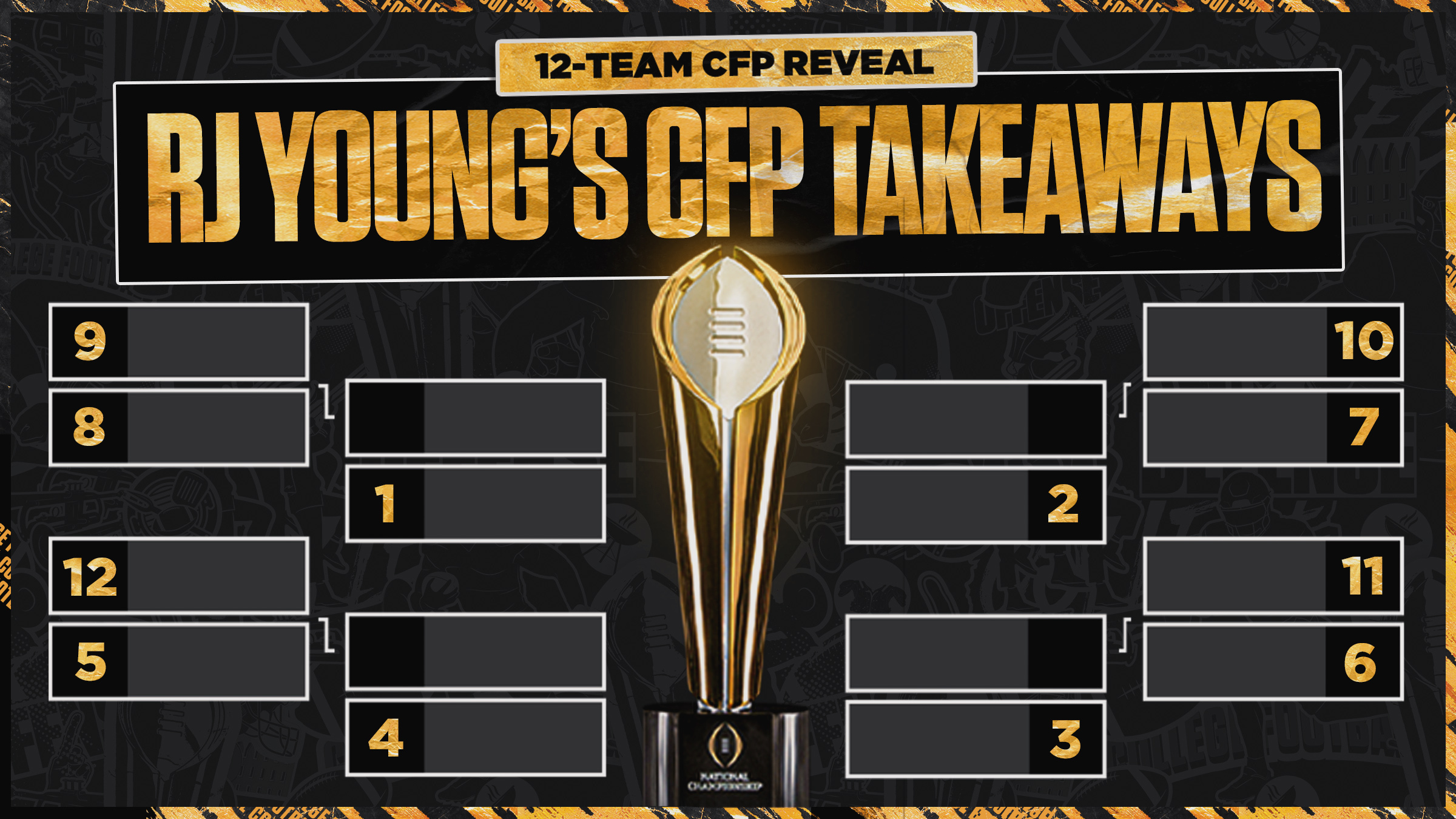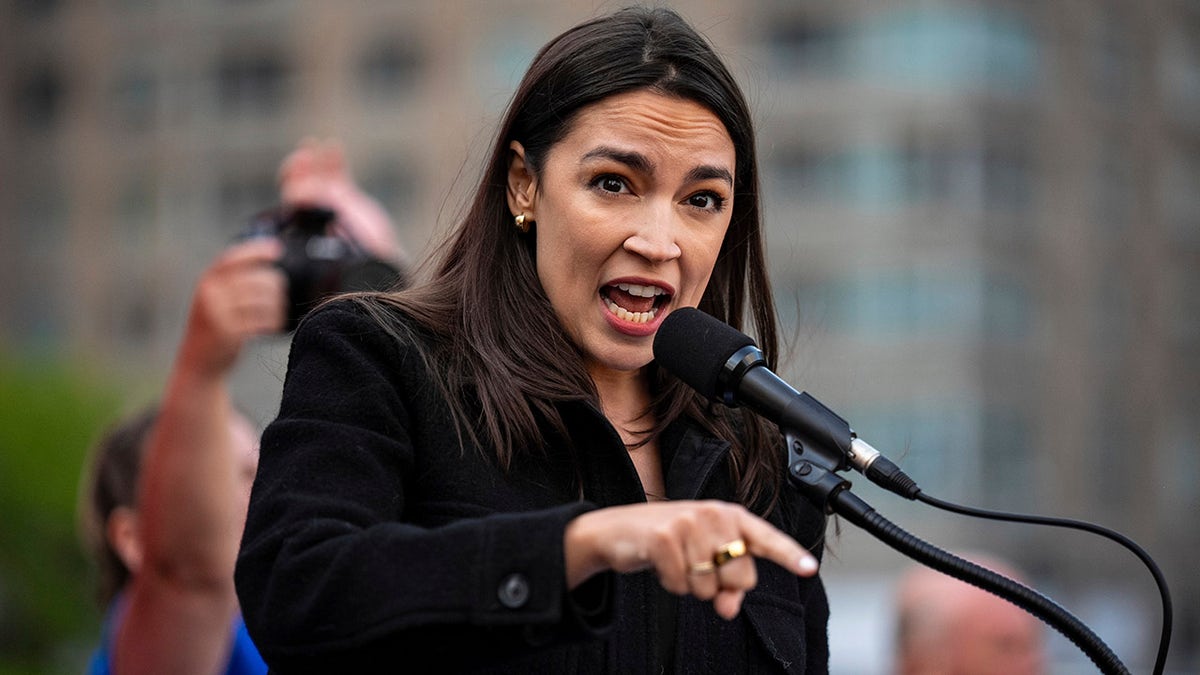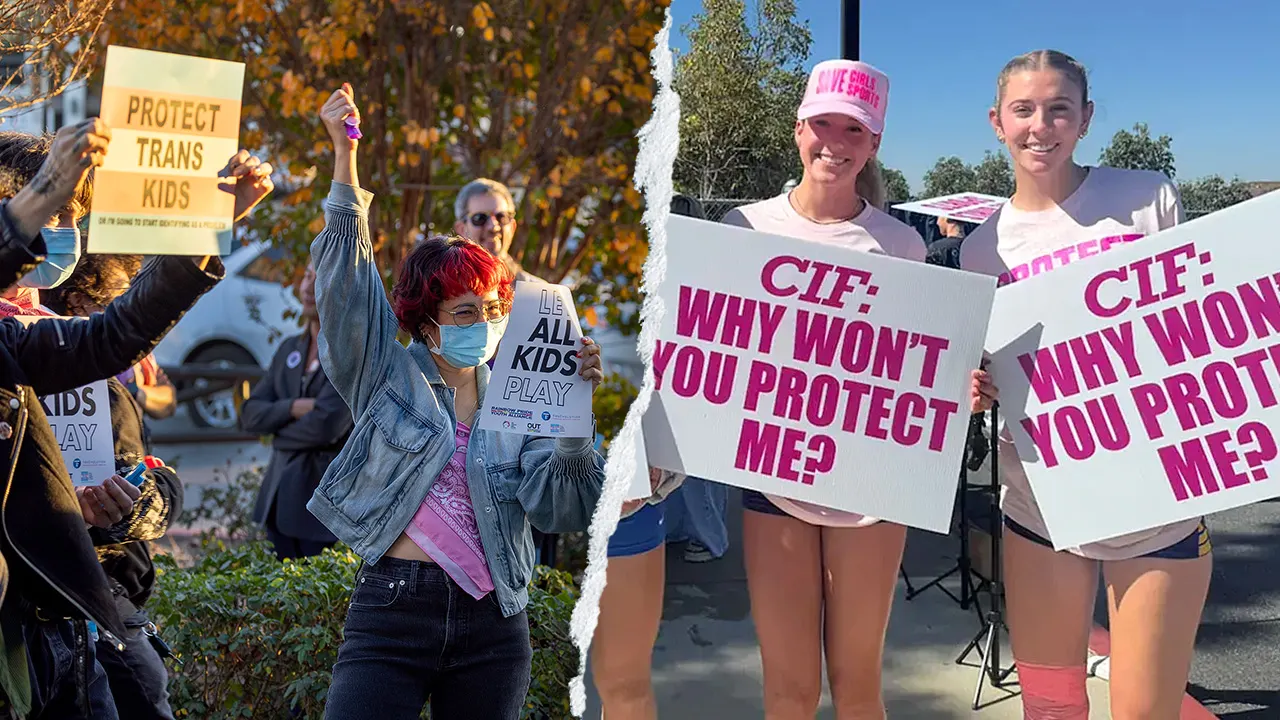
Is There a Path for USC, Texas and Michigan to Make the College Football Playoff?
Entities mentioned:
- USC: Ambition, Competitive spirit, Recognition
- Texas: Pride, Determination, Legacy
- Michigan: Redemption, Competitive spirit, Recognition
- Joel Klatt: Professional pride, Influence, Enthusiasm
- College Football Playoff Committee: Duty, Fairness, Control
Article Assessment:
Credibility Score: 75/100
Bias Rating: 50/100 (Center)
Sentiment Score: 60/100
Authoritarianism Risk: 20/100 (Strongly Democratic)
Bias Analysis:
The article presents a balanced view of multiple teams' playoff chances, using expert analysis. It doesn't show favoritism towards any particular team or conference.
Key metric: College Football Playoff Rankings
Let me tell you something - this playoff race is HEATING UP! We've got a real championship-caliber battle brewing as USC, Texas, and Michigan are making their fourth quarter push for the College Football Playoff. These teams are stepping up to the plate with everything on the line! USC's got a clear path to glory if they can pull off a HUGE upset against Oregon - that would be a game-changing play, folks. Texas fumbled the ball against Georgia, and now they're facing an uphill climb steeper than Mount Everest. But don't count out Michigan! If they can shock the world and take down the Goliath that is Ohio State, we're talking about a victory lap straight into playoff contention. This is the kind of high-stakes drama that separates the contenders from the pretenders!

Soccer superstar Cristiano Ronaldo to visit White House, coinciding with Saudi prince’s visit
Entities mentioned:
- Cristiano Ronaldo: Recognition, Legacy, Competitive spirit
- Donald Trump: Power, Influence, Recognition
- Mohammed bin Salman: Power, Influence, Self-preservation
- White House: Influence, Power, Control
Article Assessment:
Credibility Score: 75/100
Bias Rating: 55/100 (Center)
Sentiment Score: 65/100
Authoritarianism Risk: 35/100 (Generally Democratic)
Bias Analysis:
The article presents a balanced view of the visit, including both positive aspects and controversial background. It doesn't lean heavily towards praising or criticizing any party involved.
Key metric: US International Relations and Soft Power
Let me tell you something - this story is RIDICULOUS! We've got a POWERHOUSE lineup stepping onto the field at the White House! Cristiano Ronaldo, the GOAT of soccer, is making a rare appearance on US soil, and he's not just here for a friendly match! This is a CHAMPIONSHIP CALIBER meetup with President Trump and the Saudi Crown Prince. It's like we're watching a World Cup final of diplomacy! Ronaldo's bringing his A-game from the Saudi Pro League, and let me tell you, his presence is a GAME-CHANGER for US-Saudi relations. This is fourth quarter diplomacy at its finest, folks! The White House is pulling out all the stops, treating this like a state visit playbook. But make no mistake, there's some serious defense being played here too, with the ghost of the Khashoggi situation still lurking on the sidelines. Ronaldo's visit is like a Hail Mary pass to distract from the controversy! And speaking of plays, Ronaldo's hinting at his final World Cup appearance in 2026 - talk about going out with a BANG on home turf! This is the kind of high-stakes, multi-player game that could redefine the scoreboard of international relations!

4 Takeaways From the Third CFP Rankings Release of 2025
Entities mentioned:
- College Football Playoff Committee: Power, Control, Legacy
- Hunter Yurachek: Influence, Duty, Professional pride
- Texas A&M: Ambition, Competitive spirit, Recognition
- Alabama: Pride, Determination, Legacy
- Oklahoma: Ambition, Competitive spirit, Recognition
Article Assessment:
Credibility Score: 75/100
Bias Rating: 50/100 (Center)
Sentiment Score: 60/100
Authoritarianism Risk: 35/100 (Generally Democratic)
Bias Analysis:
The article presents multiple perspectives and critiques decisions fairly. While focusing on certain teams, it maintains a balanced approach to discussing playoff contenders.
Key metric: College Football Playoff Rankings
Let me tell you something - this CFP rankings release is a GAME-CHANGER! The committee is playing 4D chess while some teams are stuck playing checkers. Texas A&M is coming in hot like a fourth-quarter comeback, but can they handle the championship pressure? Alabama's playoff hopes are hanging by a thread - they're in the red zone, but one false move could fumble their entire season! And don't count out Oklahoma - they're the dark horse sprinting down the sidelines, ready to upset the whole playoff picture! This is the kind of high-stakes drama that separates the contenders from the pretenders, folks. We're in crunch time now, and every play counts!

Over 130 Democrat congressional representatives urge SCOTUS to side with trans athlete in major legal battle
Entities mentioned:
- Democratic Congressional Coalition: Righteousness, Justice, Unity
- Supreme Court: Duty, Justice, Legacy
- Trans Athletes: Determination, Recognition, Competitive spirit
- Republican State Governments: Control, Loyalty, Moral outrage
Article Assessment:
Credibility Score: 75/100
Bias Rating: 55/100 (Center)
Sentiment Score: 45/100
Authoritarianism Risk: 30/100 (Generally Democratic)
Bias Analysis:
The article presents both sides of the argument, but gives more space to the Democratic position. It includes polling data that contradicts the Democrats' stance, showing an attempt at balance.
Key metric: Gender Equality in Sports
Let me tell you something, folks - this is a GAME-CHANGING play in the ongoing battle for gender equality in sports! The Democratic team is stepping up to the plate, swinging for the fences with this amicus brief. They're showing real championship mentality, rallying behind trans athletes like a coach defending their star players. But make no mistake, the Republican defense is digging in their heels, determined to protect what they see as the integrity of women's sports. This is shaping up to be a real clash of titans, with the Supreme Court as the ultimate referee. The stakes couldn't be higher - we're in the fourth quarter of this legal showdown, and it's anyone's game. This decision could rewrite the playbook for athletic competitions across the nation. I'm telling you right now, whichever way this call goes, it's going to send shockwaves through the sporting world!

Tyler Skaggs' widow says she was not aware of pitcher's drug use at time of death; mother also testifies
Entities mentioned:
- Tyler Skaggs: Professional pride, Self-preservation, Ambition
- Carli Skaggs: Loyalty, Justice, Righteousness
- Eric Kay: Greed, Self-preservation, Control
- Los Angeles Angels: Self-preservation, Control, Professional pride
- Debbie Hetman: Justice, Righteousness, Moral outrage
Article Assessment:
Credibility Score: 75/100
Bias Rating: 55/100 (Center)
Sentiment Score: 25/100
Authoritarianism Risk: 20/100 (Strongly Democratic)
Bias Analysis:
The article presents both sides of the case, including perspectives from the Skaggs family and the Angels' defense. It relies on courtroom testimony and avoids editorializing, maintaining a relatively neutral stance.
Key metric: MLB Player Safety and Substance Abuse Prevention
Let me tell you something, folks - this trial is turning into a FULL-COURT PRESS on the Los Angeles Angels organization! We're seeing a MAJOR LEAGUE SHOWDOWN between Team Skaggs and the Angels' front office, and it's going into extra innings! The widow and mother of Tyler Skaggs are stepping up to the plate, swinging for the fences with their testimony. They're trying to prove the Angels dropped the ball on player safety, but the team is playing defense, arguing Skaggs made his own calls off the field. This is a high-stakes game, with $118 million on the line - that's championship money, folks! The Angels are in a tough spot, trying to dodge this curveball thrown by the Skaggs family. It's fourth and long for the organization, and they need a Hail Mary to come out on top. This case is shining a spotlight on the dark underbelly of professional sports - a real PERSONAL FOUL that's left everyone asking who dropped the ball on player welfare. I'm telling you right now, this could be a game-changer for how teams handle substance abuse issues going forward!

Former college basketball player gives reason for point-shaving that led to NCAA ban: 'I was money hungry'
Entities mentioned:
- Cedquavious 'Dae Dae' Hunter: Greed, Self-preservation, Fear
- NCAA: Justice, Control, Professional pride
- University of New Orleans: Duty, Professional pride, Righteousness
Article Assessment:
Credibility Score: 75/100
Bias Rating: 55/100 (Center)
Sentiment Score: 25/100
Authoritarianism Risk: 35/100 (Generally Democratic)
Bias Analysis:
The article presents a balanced view of the situation, including Hunter's perspective and the NCAA's actions. It relies on direct quotes and official statements, maintaining a relatively neutral stance.
Key metric: College Sports Integrity Index
Let me tell you something - this story is a GAME-CHANGER for college basketball! We're talking about a major FUMBLE in the integrity playbook, folks! Cedquavious Hunter and his teammates thought they could run a fast break to easy money, but they've been called for a FLAGRANT FOUL by the NCAA! This isn't just a personal foul, it's a TECHNICAL that's impacting the whole league! The NCAA is playing FULL-COURT PRESS defense against gambling violations, and they're not letting anyone drive the lane on this one! Hunter's confession is like watching a star player crumble under pressure in the final seconds of a championship game. It's a TURNOVER that's costing him and his team BIG TIME! The University of New Orleans is now in a SUDDEN DEATH overtime situation, trying to salvage their reputation in this high-stakes match against corruption. This is the kind of OVERTIME drama that could change the whole game plan for college sports integrity!

AOC ripped by women's sports activists in response to 'Transgender Awareness Week' post
Entities mentioned:
- Alexandria Ocasio-Cortez: Righteousness, Influence, Recognition
- Women's Sports Activists: Justice, Competitive spirit, Self-preservation
- Republican Party: Control, Loyalty, Moral outrage
- Democratic Party: Unity, Influence, Loyalty
Article Assessment:
Credibility Score: 70/100
Bias Rating: 65/100 (Lean Right)
Sentiment Score: 30/100
Authoritarianism Risk: 35/100 (Generally Democratic)
Bias Analysis:
The article leans right, focusing more on criticism of AOC and Democrats. It gives more space to conservative viewpoints and uses language that frames liberal positions negatively.
Key metric: Public Opinion on Transgender Athletes in Women's Sports
Let me tell you something, folks - this political match-up is heating up like a championship game! AOC is coming out swinging with her pro-transgender stance, but she's facing a full-court press from women's sports activists. It's like we're watching a high-stakes relay race, with each side desperately trying to grab that baton of public opinion! The Republican team is running a tight defense, while the Democrats seem to be fumbling the ball with some questionable plays. I'm telling you right now, this issue is a real game-changer that could decide the championship of voter support. AOC's aggressive offense might've backfired, leaving her team exposed on the counterattack. It's fourth and long for the pro-transgender athlete side, and they'll need a Hail Mary pass to turn this around!

California high schools at odds after alleged trans athlete displaces female on cross-country podium
Entities mentioned:
- Ayala High School: Justice, Competitive spirit, Professional pride
- Claremont High School: Loyalty, Obligation, Wariness
- California Interscholastic Federation (CIF): Control, Fairness, Obligation
- Caroline Cobo (Ayala coach): Justice, Determination, Professional pride
- Matthew Ullman (Ayala assistant coach): Justice, Determination, Professional pride
- Gavin Newsom: Fairness, Unity, Political influence
Article Assessment:
Credibility Score: 75/100
Bias Rating: 55/100 (Center)
Sentiment Score: 35/100
Authoritarianism Risk: 25/100 (Generally Democratic)
Bias Analysis:
The article presents multiple viewpoints, including statements from both schools and coaches. While it leans slightly towards Ayala's perspective, it provides context and official statements, maintaining a relatively balanced approach.
Key metric: Gender Equity in High School Sports
Let me tell you something - this story is a GAME-CHANGER! We've got a real battle brewing on the track, folks, and it's not just about who crosses the finish line first. Ayala High is coming out swinging, demanding a fair shake for their female athletes in a contest where the rulebook seems to be shifting under their feet. They're playing defense against a Claremont High team that's sticking to the playbook, but Ayala's coaches are showing true team spirit, going to bat for their runner who got edged out of the top 10. This isn't just about one race, it's about the whole league standings! The CIF tried to level the playing field with their spring rule change, but now we're seeing it's not a one-size-fits-all solution. This is fourth-quarter stuff, people, and Ayala's making a bold move to challenge the league's game plan. It's a high-stakes match where the definition of fair play is on the line, and believe me, every coach and athlete in California is watching to see how this plays out!

Bengals receiver Ja’Marr Chase suspended 1 game by NFL for spitting on Steelers’ Jalen Ramsey
Entities mentioned:
- Ja'Marr Chase: Competitive spirit, Pride, Self-preservation
- Jalen Ramsey: Competitive spirit, Indignation, Self-respect
- NFL: Professional pride, Justice, Control
- Cincinnati Bengals: Loyalty, Competitive spirit, Self-preservation
- Zac Taylor: Loyalty, Duty, Competitive spirit
Article Assessment:
Credibility Score: 85/100
Bias Rating: 50/100 (Center)
Sentiment Score: 30/100
Authoritarianism Risk: 35/100 (Generally Democratic)
Bias Analysis:
The article presents a balanced view of the incident, including statements from multiple parties involved. It relies on official sources and presents facts without evident partisan slant.
Key metric: NFL Player Conduct and Sportsmanship
Let me tell you something - this is a MAJOR PENALTY flag on the field of sportsmanship! Ja'Marr Chase, the star receiver for the Bengals, has just been SIDELINED by the NFL's disciplinary committee. This is a FOURTH QUARTER MOVE that could cost the Bengals big time in their upcoming matchup! The league is stepping up to the plate, showing they won't tolerate unsportsmanlike conduct that crosses the line. This isn't just a 15-yard penalty, folks - we're talking about a GAME SUSPENSION! Chase's actions have put his team in a tough spot, and now they'll have to adapt their offensive playbook without their top weapon. It's a FUMBLE in player conduct that the Bengals can't afford in their already struggling season. The NFL is sending a clear message: play with fire, and you'll get BURNED off the field too! This is the kind of MENTAL ERROR that can cost you championships, and Chase will need to show some SERIOUS HUSTLE to regain his reputation after this UNSPORTSMANLIKE CONDUCT!
Chris 'The Bear' Fallica's Top 10 College Football Rankings: Week 13 Edition
Entities mentioned:
- Chris 'The Bear' Fallica: Professional pride, Influence, Recognition
- Ohio State: Competitive spirit, Pride, Legacy
- Alabama: Determination, Competitive spirit, Redemption
- Miami: Ambition, Recognition, Competitive spirit
- College Football Playoff Committee: Duty, Fairness, Control
Article Assessment:
Credibility Score: 70/100
Bias Rating: 55/100 (Center)
Sentiment Score: 65/100
Authoritarianism Risk: 20/100 (Strongly Democratic)
Bias Analysis:
The article shows slight bias towards Miami, likely due to the author's alumni status. However, it attempts to balance this with objective comparisons to other teams' performances.
Key metric: College Football Playoff Rankings
Let me tell you something - this story is a GAME-CHANGER in the college football world! The Bear is throwing a Hail Mary pass here, folks, putting his alma mater Miami in his top 10! This is the kind of fourth quarter move that could shift the entire landscape of the playoff picture. He's stepping up to the plate for the Hurricanes, making a bold case that they deserve to be in the conversation. But let's not forget the heavyweight champs like Ohio State and Georgia - they're still dominating the field with a championship mentality. Meanwhile, Alabama's fumbling the ball, dropping down the rankings faster than a quarterback under pressure. It's crunch time, people, and every team is fighting for their playoff lives! The committee better watch out, because The Bear is calling audibles and challenging their game plan. This is the kind of analysis that separates the contenders from the pretenders in the high-stakes world of college football rankings!